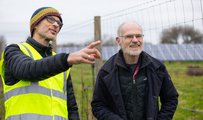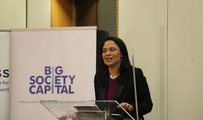Back in September we launched our organisational strategy focusing on four priority investment systems - impact venture, social and affordable housing, social outcomes contracts and social lending. Given that 43% of the deals undertaken in the social impact investment market fall under social lending, it’s hopefully no surprise that we’ve chosen it as one of the key sectors where we believe we can make the biggest difference. We know that we won't achieve this on our own, and in this blog, I want to outline the key steps which we need to take across the sector if we are to deliver on objectives.
What do we mean by social lending?
The vast majority of social enterprises and charities don't have share capital and are therefore not easily able to access equity investment. The most common form of borrowing for these organisations is therefore in the form of a loan (or debt).
When we talk about social lending, we mean the whole range of lending products available to the sector including the 3 Bs - Bank lending, Bonds and Blended finance.
Loans from banks are often 'secured', which means they are offset against an asset, often property which is generally viewed as the least risky type of lending. Unsecured loans are also a very common tool but present a higher risk for investors; as there is little in terms of recovery of capital available should the investment not go according to plan. As a result, the price of borrowing will reflect this risk.
Charity bonds which are really just loans, often with a higher value (usually over £500,000) and offered to retail investors, usually via a platform.
Blended Finance via the Growth Fund now makes up around 30% of all deals in this space, as the median need for finance has stayed steady at £50,000, this is a fundamental part of the social lending supply chain.
Resilience and growth
Access to finance remains one of the biggest challenges organisations face when it comes to sustainability and growth - that’s why in our social lending strategy we are focusing on these two key strands.
We know that social enterprises and charities are extremely resilient; the pandemic response has further evidenced this along with recent data from SEUK’s No Going Back - State of Social Enterprise Survey 2021 which showcased the resilience of social enterprises and charities, in particular their ability to pivot and adapt during the pandemic to meet the needs of people and communities. We need to have the finance and funding in place to help to continue to support them.
Particularly for underrepresented and harder to reach communities, getting access to affordable finance remains a key barrier. For example, from the No Going Back Report, the challenges faced by some such enterprises are:
- Organisations led by people from racialised communities received on average 93% of the finance they sought. They are more likely to be put off by the time a decision might take or the hassle (20%), as well as being less certain where to find appropriate finance (15%) and less confident about capacity to take on finance (20%)
- Organisations led by people with disabilities received only 28% of the finance they sought and are particularly likely to expect to be rejected (44%).
- Organisations working in those most deprived areas of the UK are significantly more likely to have drawn on their reserves (48%) and to have postponed investment (37%)
Diversity and reach
Taking these points into account, we have set ourselves two significant targets:
Diversity: 50% of social lending to be from underrepresented groups
Reach: 50% of social lending available in most overlooked communities (30-50% IMD)
The keys to making this possible
Partnership with social investors, key sector membership bodies and networks, including Access - The Foundation for Social Investment and Good Finance, will all be vital to helping to improve access to affordable finance. To do this effectively we need to ensure that lending works for potential investees and investors alike. To generate patient, affordable and risk bearing capital, we are collaborating with partners on three key areas:
- Government guarantees - Bounce Back Loans (BBLS) and the Coronavirus Business Interruption Loan Scheme (CBILS) have shown how government backed finance can support speed and risk bearing. The social impact investment response to ensuring social enterprises and charities could take full advantage of the scheme resulted in the Resilience and Recovery Loan Fund disbursing just under £24 million of loans to organisations right when they needed it most. With the guarantee now being extended (albeit reduced to 70%) and the Recovery Loan Fund follow on in place, we are committed to demonstrating with partners the vital role that this type of support can continue to play.
- Tax concessions – many of you will know the hard-fought battle to save Social Investment Tax Relief (SITR) resulting in a two-year extension. There is a real opportunity to unlock individual investment for impact and whilst SITR hasn’t replicated the success of the Enterprise Investment Scheme (EIS) and Seed Enterprise Investment Scheme (SEIS), it doesn’t mean there isn’t an important role for this tool. We’ve launched 'The Individual Impact Investing Commission’ in collaboration with Beacon Collaborative to make the case for new ways to incentivise private wealth in creating impact.
- Catalytic capital - grant to underpin investment has been one of the most significant developments during my time working at Big Society Capital with the creation of Access, a game changer in making possible both small and affordable loans to social enterprises and charities. Where would the market be if more ‘blend’ doesn’t become available to secure continuity of the Growth Fund. This for me will be an unthinkable return to the dark ages. Dormant bank account money has been a precious resource, but we need now to introduce new sources of catalytic capital with our sector partners and this is a fundamental part of our plans.
Just last week we tested our thinking with our Advisory Board and they flagged the impending complexity that Net Zero will bring. Whilst a critical strand in protecting our planet, we know that social enterprises and charities will be impacted by the further demands of reporting to third parties and the ambitions of those. We need to consider how we can help and support this journey.
In short, partnership is everything. Our social lending aims are not all about Big Society Capital; we can’t, won’t and don’t want to do this on our own. If we can achieve these ambitious goals, the lending space for social enterprises and charities will be better. More access to more affordable finance with potentially new ways of lending being developed. What’s not to like?
We will shortly be launching a new initiative: The Solutions Collective which will seek to bring insight and challenge and provide a continuous feedback loop as our social lending work develops.
If you have thoughts on our approach, have ideas to partner with us or simply want to connect, please get in touch.










